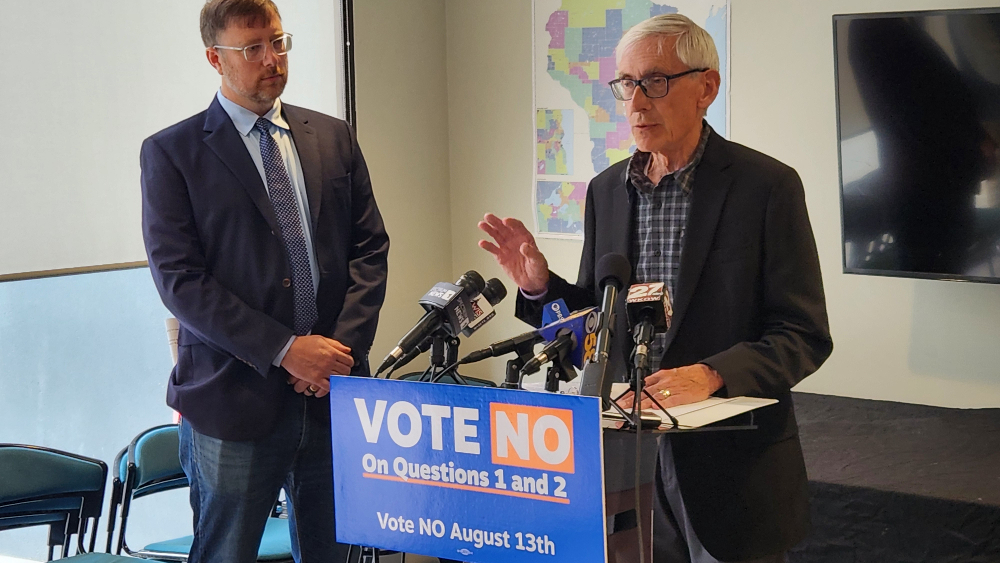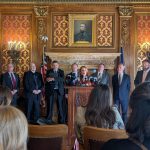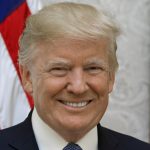Proposed Constitutional Amendments a Battle Over Control of Federal Funds
Republican legislators seek to reduce governor's longstanding power over this.

Gov. Tony Evers speaks at a press conference Monday with Democratic Party of Wisconsin Chair Ben Wikler, left, opposing two referendum questions on the Aug. 13 primary ballot for an amendment to the Wisconsin Constitution that would end the governor’s authority to allocate federal funds. (Wisconsin Examiner photo)
A proposal to amend the Wisconsin Constitution that could dramatically change how federal emergency funds are allocated in the state will go to voters in the Aug. 13 primary election.
The measure has prompted juiced-up campaigns to pass or block the proposal on what’s expected to be a low-turnout voting day.
Advocates argue the proposed amendment would ensure that the Legislature has input on spending emergency federal funds. Opponents contend that the result would tie the hands of Wisconsin governors now and in the future, preventing them from moving quickly in a crisis such as the COVID-19 emergency in 2020 and frequent natural disasters including tornadoes and floods.
The proposed amendment has two parts. The first would state that the Legislature could not delegate its power to appropriate money. The second would require all federal funds Wisconsin receives to go through the Legislature before a governor could allocate the money.
“This resolution increases accountability, efficiency, and transparency in the expenditure of funds received from the federal government by restoring the legislature’s role in approving those expenditures,” said Sen. Howard Marklein (R-Spring Green) at a public hearing early this year. Marklein co-authored the amendment with Rep. Robert Wittke (R-Racine).
On Monday, Gov. Tony Evers and the Democratic Party of Wisconsin held press conferences in Madison, Eau Claire and La Crosse to urge voters to vote “No” on both questions — calling the amendment “a power grab” by the Republican majority in the Legislature.
Making it ‘difficult to respond in a crisis’
If enacted, it “will be extraordinarily difficult for any governor — not just me — to respond to a crisis,” Evers said at the Madison press conference.
The proposed amendment was introduced originally in the 2022 legislative session after Republican lawmakers unsuccessfully tried to direct how Evers, a Democrat, spent the billions of dollars in federal pandemic relief that came to Wisconsin.
If enacted, the proposed amendment “will absolutely delay implementation of federal funds” sent to the state in response to an emergency, Evers said.
A longstanding state law dating back to the 1930s authorizes Wisconsin’s governor to accept federal funds sent to the state. According to a Legislative Reference Bureau memo from 2022, the law authorizes the governor to direct the funds to appropriate state agencies and “gives the governor the sole authority to accept the provisions of federal acts making moneys or other benefits available to the state and to take necessary actions in connection with such provisions.”
Wisconsin received about $1.9 billion from the CARES Act, the first major federal COVID-19 relief law, enacted in March 2020 under then-President Donald Trump, and another $2.5 billion from the American Rescue Plan Act (ARPA), enacted a year later after President Joe Biden took office.
In 2020, after the state Legislature met to pass legislation so that Wisconsin could receive its share of the CARES Act funding, the Republican majority leadership declined to call any more floor sessions for the rest of the year.
“I worked with local leaders, I’ve worked with organizations and worked with state agencies and worked with the federal government to get the relief out quickly and where it would make the best impact,” Evers said Monday. Without the authority that state law confers now to spend those funds when the Legislature failed to meet, he added, “I could not have responded with the money that was there.”
Withholding relief funds
Evers pointed to an ongoing impasse in which the Republican majority of the Joint Finance Committee has blocked spending on PFAS remediation, addressing literacy education in elementary schools and providing health care aid to the Chippewa Valley after two hospitals there closed earlier this year.
“All those things were passed in law. I signed it,” Evers said. “That money should have been released.”
After ARPA was enacted, Republican lawmakers repeatedly sought through legislation to shape how that round of pandemic relief was spent. Evers rebuffed each attempt throughout 2021 and 2022, pointing to the statute.
The legislators’ first attempt was to pass a bill enabling the Legislature’s Joint Finance Committee to overrule Evers’ allocations of ARPA spending, which Evers vetoed. The first specific GOP proposal directed ARPA funds to a $1 billion property tax rebate, which the governor also vetoed. Numerous other pieces of legislation sought to apply ARPA funds to various uses, and Evers vetoed all of them.
Constitutional amendments must pass two consecutive two-year sessions of the Legislature in the form of joint legislative resolutions, which are not subject to a veto by the governor. Voters must then vote in a statewide referendum for the amendment to take effect.
The first ballot questions asks voters, “Shall Section 35 (1) of Article IV of the Constitution be created to provide that the Legislature may not delegate its sole power to determine how moneys shall be appropriated?”
The second question asks, “Shall Section 35 (2) of Article IV of the Constitution be created to prohibit the governor from allocating any federal moneys the governor accepts on behalf of the state without the approval of the Legislature by joint resolution or as provided by legislative rule?”
In an analysis of the amendment language for the University of Wisconsin State Democracy Research Initiative, attorney Bryna Godar wrote that the Legislature “already plays a role” in how most federal funds that come to Wisconsin are spent, because the money is directed to specific programs through the state budget.
“However, it is unclear if this amendment could impact federal funding processes more broadly,” Godar wrote, “and it may fall to the Wisconsin Supreme Court to determine the exact bounds of what federal funding is covered.”
Republican-allied groups support
Conservative groups typically aligned with the Republican party, including Wisconsin Manufacturers and Commerce, the Wisconsin Institute for Law & Liberty, the Badger Institute and the Institute for Reforming Government, have been endorsing the amendment.
“A ‘yes’ vote on the constitutional amendments on the August ballot will help hold the politicians accountable for billions of dollars in spending,” the Badger Institute’s president, Mike Nichols, wrote in a mass email message earlier this month.
Opposition comes from a wide array of organizations. Some of them are groups that have historically aligned with the Democrats, including a number of environmental organizations. Others have been historically nonpartisan, including the League of Women Voters, the Wisconsin Democracy Campaign and Common Cause.
Wisconsin Conservation Voters Vice President Cynthia Hirsch, who took part in the press conference with Evers Monday, rejected the claim by proponents of the amendment that it was “somehow correcting an imbalance of power” in state government. “Nothing could be farther from the truth in our state.”
Lawmakers and the governor already both have a say when the state budget is drawn up, she said.
“We need our governor to be able to spend emergency funds, whether it’s for the environment or for health, or for some other public disaster, regardless of what party our governor’s from, and without slowing it down and getting it bogged down in a legislative process,” Hirsch said. “If these referendums pass the governor won’t be able to do that.”
Proposed constitutional amendment triggers fight over control of federal funds was originally published by Wisconsin Examiner.






















Voting “Yes” on these amendments will result in our state legislature holding federal funds hostage, just like they have been doing for years with shared state tax revenue. I urge everyone to vote a resounding “NO” on both of these amendments.
Vote no. The legislature doesn’t actually do any work. Gavel in/ gavel out.
When an unknown Republican on the Joint Finance Committee anonymously killed a proposal for the Stewardship Fund to pay for the Cedar Gorge Clay Bluffs Proposal, Governor Evers covered it with Federal funding available to him. If the Republican Legislative Leadership gained control of the Federal money that the Governor is authorized to spend, the money would not be spent on programs most any Republican legislator would object to. If it is finally allocated during a crisis, it will be predictably late to do any good.